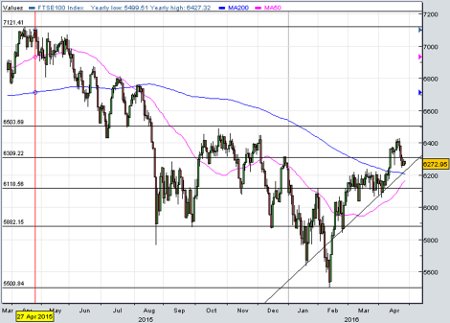FTSE 100 marks major anniversary
27th April 2016 12:03
by Lee Wild from interactive investor
Share on
If a year is a long time in politics, it's an eon in financial markets, where algorithms can execute trades in nanoseconds. But what happened 12 months ago remains highly significant today, and will likely be the yardstick against which the domestic stockmarket is judged for many months, possibly even years to come. We are, of course, talking about the FTSE 100's record high.
On 27 April 2015, the FTSE 100 hit what turned out to be its peak at 7,122. It had already got one monkey off its back, hitting a 15-year high - its best since the dotcom boom - in February. A month later it finally broke above 7,000, a huge psychological landmark.
Twelve months on and the blue-chip index is trading 850 points, or 12%, lower at 6,272. It was even worse in February. Then, the deficit was an ugly 1,622 points, or 23% from peak to trough.
A year ago, confidence was being driven by low interest rates and hopes that Greece would avoid financial collapse. It did, and banks and miners led the index to the record. Since then, however, bull market has turned to bear. So what went wrong?

Quick answer: markets don't go up in a straight line. Bull markets eventually lose momentum, and when earnings growth no longer justifies sky-high valuation multiples, professional investors typically do not need much encouragement to take profits and move on.
This time it was the Chinese stockmarket bubble which burst spectacularly in June and again in August. Then, in December, European Central Bank (ECB) president Mario Draghi dropped a massive bombshell, failing to deliver a widely expected wave of further monetary stimulus. Two weeks later, and after months of speculation, the Federal Reserve hiked US interest rates for the first time in nearly a decade.
And, if needed, there's always dollar strength, oil prices, an emerging market slump, negative interest rates, or the European Union (EU) referendum to keep traders interested. It's why the VIX - a measure of volatility often referred to as the "fear index" - hit levels not seen since the financial crisis in 2008.
Remember, too, that 2016 suffered the worst start to a calendar year in living memory. Oil prices sank to a 13-year low in January, while a commodities crash and plunging banks headed what Citigroup began calling a "death spiral". Consequently, the FTSE 100, packed with mining and oil companies and their suppliers, crashed to its worst levels since summer 2012.
What now?
A recovery since that grim day in February stretched to over 900 points, or 17%, last week. A stampede back into heavyweight mining stocks and bombed-out financials is responsible for a significant chunk of that.
has more than doubled in value, is up 62% and 39%. And a surge in metal prices, the catalyst for the recovery, appears to be backed by policy support in China and a renewed focus by the central government on economic growth, rather than reform.
Oil back above $40 a barrel is clearly good news for and , up 22% and 15% respectively. Both are slashing costs and Shell's acquisition of BG is a smart move. Even , a dog for much of the past two years, is up 18% since February after the market decided buying Argos was a good idea after all, despite massive execution risk.
China certainly seems to be heading for a "soft" landing rather than a "hard" crash.
And volatility has subsided almost to summer 2015 (pre-China crash) levels. A small decline in Chinese annual GDP growth to 6.7% was well within forecasts, and attention has now shifted to US interest rate policy.
However, there are growing concerns about China's total debt - now 237% of GDP - and the next crisis could still be brewing there. The global economy is hardly motoring, either, and appears still over-reliant on stimulus measures and worryingly high consumer debt. US earnings season is tipped to be the worst in years, and profit growth is proving harder to come by.
Over here, the EU referendum on 23 June is grabbing headlines and played up as the big issue for financial markets. It's not. If the UK votes for "Brexit" there will be huge repercussions, but it appears increasingly unlikely.
The big swingers for markets, as always, will be China and the US. Fed rate-setters reveal their latest conclusions Thursday evening. Their comments, rather than the decision - a guaranteed "no" to a rate rise this time - will be the mover for share prices.
Experts are split on which way the market goes next. Momentum is certainly positive just now, but, with the summer months drawing closer, when liquidity typically deteriorates, expect volatility to pick up again.
This article is for information and discussion purposes only and does not form a recommendation to invest or otherwise. The value of an investment may fall. The investments referred to in this article may not be suitable for all investors, and if in doubt, an investor should seek advice from a qualified investment adviser.